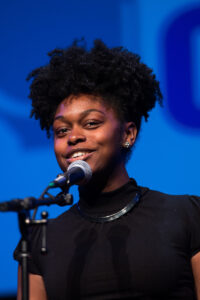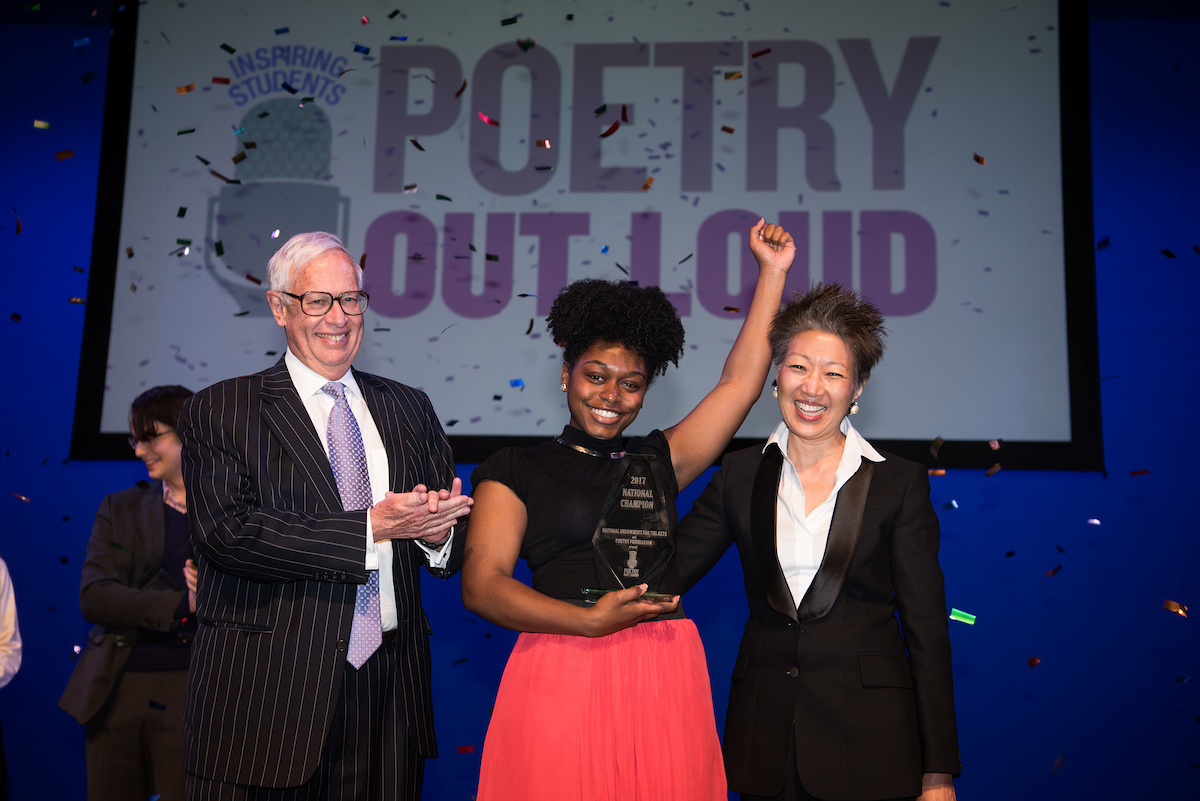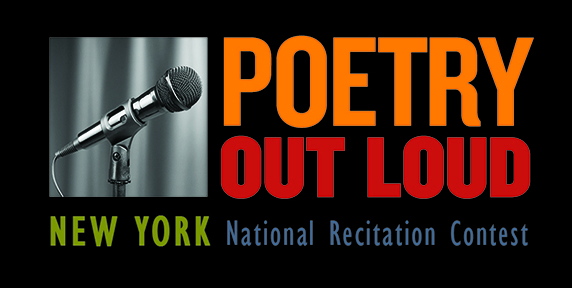In April 2017, Samara Huggins was named National Poetry Out Loud Champion at the national final in Washington, DC. Samara, from Marietta, Georgia, is now a first-year student at Pratt Institute in New York City. She sat down with poet, playwright, and long-time T&W teaching artist Dave Johnson to talk about her Poetry Out Loud experience and her advice for students taking part in POL.
Teachers & Writers: Samara, how did you feel when you were chosen as 2017 national champion?
Samara Huggins: At first, it didn’t feel real, so my reaction was really calm. My friends were watching it live, and they said why didn’t you scream or jump or something? It’s because it didn’t feel real at the time, but on the inside I was really happy.
T&W: And why would you say that you got involved in Poetry Out Loud?
SH: It was mandatory my freshman year in English. So we all had to present a poem in front of our class, and then if we won our class competition we were in the school-wide competition, and I ended up winning that—the school competition. It made me realize that I had a talent for it. It made me want to keep trying to see if I could do better.
T&W: How did you decide which poems to recite? What was that process like?
SH: The Poetry Out Loud program provides an online anthology of hundreds of poems that we have to choose from. So if I can choose anything that I want, then I will choose something that speaks to me. The poems that I’ve chosen over the years have been ones that either I can personally connect to or I know that I can present in a way that other people can understand them.
T&W: Can you say just a little bit more about what it’s like when a poem speaks to you?
SH: I guess I want it to feel natural when I present it. I don’t want it to feel like a performance. I want it to feel as though I could have said those words. I want to have the same emotion that the speaker has and convey that to the audience.
T&W: What is the process of finding that poem?
SH: I have to do a lot of research. I have to, of course, analyze the poems multiple times, and then learn a little bit about the poets to see if that can influence how I interpret the poems.
I don’t want it to feel like a performance. I want it to feel as though I could have said those words. I want to have the same emotion that the speaker has and convey that to the audience.
T&W: Do you read other poems by that same poet?
SH: I have before. For example, WD Snodgrass, I presented one of his poems, “A Locked House,” I think my sophomore year. In order to understand more about him I did read more of his poems, but I haven’t done that with all the poets that I’ve chosen.
T&W: How was the competition different as you went from your school level, local level, and on up to the national level?
SH: I think it goes without saying that the competition got more intense in terms of the competitors themselves. Because the talent level went up. By the time I got to the national competition, everyone was good. I was in the audience and I was watching my peers perform, and I felt bad for the judges because how do you decide who presented a poem better than another person? I mean everyone was so good and it blew me away.
I had to change the way that I delivered the poems. My Poetry Out Loud coordinator—the state coordinator for Georgia—she suggested before the national competition that I watch videos of past national competitions, and as I did that I saw that the performers were able to have more motion when they performed. They didn’t seem as rigid in their body language.
T&W: When you say motion, you mean physical movement?
SH: Right. Because one of the guidelines with Poetry Out Loud is that you’re not supposed to move too much. It’s not a dramatic performance, it’s a poetic recitation. So when I saw that they were able to move their hands and have more emotion, I had to change that performance.
T&W: Because you weren’t doing that at the local level or even the state level?
SH: Right. My hands were mostly by my side and I was just giving it with my voice and my face. But then I realized, okay—I can relax. I can use my hands if I want to.
T&W: What would you say surprised you the most about your POL experience?

SH: Probably how much it impacted me. It actually changed me. From my freshman year to my senior year, I became a much more humble person due to this program. Freshman year I went into the competition, and I was new to it so I was just excited. I was excited that I made it to regional, that I made it to state.. And then I got to sophomore year, and I felt better prepared for the competition, but I was still in a place where I knew that there were people better than me. But I went to state and I came in second place to the second-place national winner that year. So it made me feel that I could do this, you know? I got arrogant in a way. So my junior year, I came back and I hadn’t rehearsed as much as I should have, and during the state competition I wasn’t really watching my peers in a respectful way. I was just sitting there and not really paying attention to what they were saying. And that attitude messed me up. I didn’t even place in state that year. So when I came back my last year, I made sure that I took everything in stride. And I was grateful for every progression that I made.
T&W: So you learned a heck of a lot. What is the best thing about participating in Poetry Out Loud?
SH: Well, you gain public speaking skills, and confidence if you don’t already have it. A lot of my peers, they were actors or theater people.
T&W: Are you?
SH: I’m not.
T&W: You’re not a theater people?
SH: No. [laughter]
T&W: You’re in New York now. You might be! [laughter] By default, you are now.
SH: Most of them were really outgoing.
T&W: You’re not outgoing?
SH: Not for the most part, but if you’re not that way, then it’s even better for you to participate in this program because you learn how to express yourself in front of large crowds of people.
I recognized as I watched people do the same poems and even people do the same poems that I did, that everyone has their own voice and everyone interprets the poems differently. I had to be confident or learn how to be confident in my intuition.
T&W: What was the hardest part of the program for you?
SH: Probably deciding on how to present the poems because these poems can be interpreted in numerous ways. I recognized as I watched people do the same poems, and even people do the same poems that I did, that everyone has their own voice and everyone interprets the poems differently. I had to be confident or learn how to be confident in my intuition. That was pretty difficult to do.
T&W: If another student came to you and said, should I do this? Should I do POL? What would you say?
SH: I would say to try it because you never know, just like I didn’t know that I could talk in front of my whole school and not be a mess in front of them. I mean, you might be able to tell the story of that poem better than someone could interpret it on their own.
T&W: Is that how you see them? They’re sort of stories in a way?
SH: Oh, yes, definitely.
T&W: And you feel like it’s about telling that story?
SH: It is. It’s about telling that story, making sure that the audience understands it, conveying all the emotion and nuances.
T&W: Do you know in the moment that the audience is with you?
SH: Sometimes! If I make eye contact with someone and they nod because they understand what I’m saying at that moment, then I know. Good, Samara. You’re on the right track. Don’t change anything.
T&W: That’s all happening while you’re up there?
SH: Oh, yeah! Because once you memorize the poem, it’s in you and it’s second nature. You want it to seem so natural that it doesn’t sound like a performance, it doesn’t look like a presentation. So if it’s just coming out of your mouth, then you have time to think and the audience understands.
T&W: Do you feel like it’s a dialogue in a way?
SH: It is. Certainly. Especially if you have a really important message to tell about the poem and want it to be conveyed, you might even… Well, it’s kind of required that you look at the judges because they grade on eye contact. So yeah, every now and then, you make sure that you look at the judges when you say something really important. So it is a dialogue.
T&W: How long have you been interested in poetry?
SH: I used to write short stories a lot, from third grade to eighth grade. I started writing my own poems around sixth grade. I still have them; they weren’t that good, but I liked poetry and creative writing for a long time.
T&W: Was there an influence, like a teacher, early on?
SH: No, I don’t think so. Like I said, I’m not that outgoing, and I had one best friend from second grade to fifth grade, and it was basically just the two of us for what, three years? We didn’t talk that much. So writing down what I felt at the time, even if it required me creating a character and expressing myself through that character, I did it. So I think writing was a way for me to just… Talk.
T&W: And were you keeping journals or…
SH: Yes.
T&W: That’s great. And are you still writing?
SH: Not as much because I’ve learned that I need to talk! [laughter]
T&W: Talk out loud! Did taking part in Poetry Out Loud make you think differently in any way about poetry?
SH: I realized that it can be more conversational than one might initially think, because when you think poetry and you’re a freshman in high school, you think Shakespeare and all this fancy eloquence. But the first poem that I did for Poetry Out Loud my freshman year was “Dream Song 14” by John Berryman, which was actually one of the ones that I did this year. And that’s very contemporary and just a straight conversation. So it showed me that poetry can be kind of casual. I really love that poem.
T&W: So you feel like it works for you.
SH: Oh, yeah. It’s got a very sardonic and cynical tone, and I can convey that pretty well. And it makes the audience laugh, so I like it a lot.
T&W: Sardonic and cynical. So that’s Samara! [laughter] I was going to ask if you had a favorite poet, but maybe you’ve already answered that.
SH: Yes, maybe John Berryman. He’s one of the ones that I did extensive research on, to see why his poem was the way it was. And he’s kind of a sad person I think. He had a hard life. He was depressed, and committed suicide and stuff, and had all this trouble with his love life. So knowing about him helped me know about the poem more.
T&W: Would you suggest that for students that were going to do this? To do a little more background research?
SH: Definitely, but I want them to be careful about mistaking the poet for the speaker of the poem. Just because you know who the poet is and how they are doesn’t mean that that’s who’s in charge of the words of the poem.
T&W: That’s a very good point. So you felt like you could really make that distinction, even after reading the bio. To say, well, I can’t just assume this voice is this biography.
SH: Right.
I want them to be careful about mistaking the poet for the speaker of the poem. Just because you know who the poet is and how they are doesn’t mean that that’s who’s in charge of the words of the poem.
T&W: That’s great. You’ve said a little about this, but maybe I’ll ask it in a slightly different way. What did you learn about yourself specifically during Poetry Out Loud?
SH: I guess through the poems that I chose, I learned what kinds of personalities I could take on. I know that I can’t take on a soft, beautiful, romantic poem. I tried to take on a really melancholy, sad poem once, and the judges didn’t like it. I could tell. I actually talked to them after the performance, and they were like, “Eh, well, it was okay.” So, I know that I can do sarcasm. I can do something that’s a little bit nostalgic, but not sad per se. And intense.
T&W: You can do that.
SH: I can do intense.
T&W: Comedy?
SH: If it’s dry humor. I think it has a lot to do with your voice, and my voice does well reflecting lower tones. And with sarcasm I can go lower. But if I tried just to do a comedic poem I might have to raise my octave a little bit, and that might not make anyone laugh, and it would feel so forced.
T&W: Do you see yourself as a performer?
SH: When you say performer, I think actor.
T&W: And you don’t see it that way.
SH: I don’t see it that way at all.
T&W: How would you describe it?
SH: I guess in a way, somewhere in between a storyteller and someone who’s giving a speech. Because speeches are persuasive, but storytelling tends to send more of an emotional message. I think it’s a mix between the two.
T&W: So a storyteller and sort of an orator in a way.
SH: Right. But even with storytelling, you can move around and have instruments and that kind of thing. You don’t do that with a poetry recitation. You have to be a little bit more structured, like you’re giving a speech.
T&W: Can you tell us a little bit about what you’re doing now that you’ve finished Poetry Out Loud? You’ve done the world tour… [laughter] What are you doing now?
SH: Right now I’m a freshman at Pratt Institute in Brooklyn. I’m a fashion design major. It’s really, really fun. My hands hurt, though. We draw every day! I just had a four-hour drawing class. My hands are going to be really strong after this. What else am I doing? Not that much. I’m just trying to become a New Yorker. [laughter] I’ve been walking around a lot, learning the neighborhood.
T&W: Taking the trains…. Are you pursuing a writing class at all, or a poetry class right now?
SH: I want to minor in literature and writing. I don’t really have a desire to write my own creative pieces seriously. If I do it, then it’s on my own time. It’s on a whim. But I really enjoy writing essays, and reading books, and analyzing books. I find myself having a hard time, like in my art history class if we have to read a passage and just summarize it. I have a hard time just summarizing. I want to go into the rhetoric, and the diction, and all this different analytical stuff because I like writing essays.
T&W: So you want to get into that a little more. What would you say are your long-term goals?
SH: I used to know. If you would have asked me that maybe two years ago, I would have said to have my own fashion brand and to live in New York. But now, I’m not so sure.
T&W: What changed?
SH: I guess I realized that there’s a lot more to the fashion industry than just having your own brand out there. I could be an illustrator. I could be a seamstress, a tailor. I don’t know! So I just have to do a lot of internships over the next three years and learn where I fit.
T&W: It’s like finding a poem that fits. You really are a fashion designer!
SH: I guess so! [laughter]
If you are in New York State and want to learn more about Poetry Out Loud, email pol@twc.org. POL coordinators for other states are listed on the national Poetry Out Loud website.
Photo (top) credit: James Kegley



